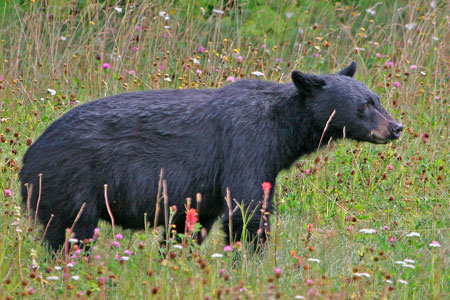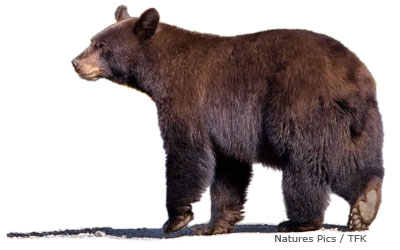

|
American Black Bear (Ursus americanus) What they look like: The American Black Bear is the most common bear native to North America. The coat of a Black Bear is shaggy and usually black but it can also be dark brown, cinnamon, or yellow-brown. Eyes are brown (blue at birth). Skin is light gray. The black bear is about 4 to 7 feet long from nose to tail, and two to three feet high at the shoulders. It has small eyes, rounded ears, a long brown snout, a large body, and a short tail. Males weigh an average of 150-300 lbs. 
Where they live: American Black Bears are found in the forested areas of Canada, USA and Mexico. They once occupied nearly all of the forested regions of North America. Black bears live in a variety of habitat types. They are mainly found in forested areas with thick ground cover and an abundance of fruits, nuts and vegetation. During the winter they hibernate in dens. Click on a range map to see where black bears live in Washington. What they eat: American Black Bears are omnivores. Most of their diet is plant based. American Black Bears mainly feed on vegetation including herbs, grasses, roots, buds, shoots, honey, nuts, fruit, berries and seeds. They will also eat fish, small mammals, insects, dead animals and garbage. In northern regions, black bears eat salmon that they catch in a stream. Behavior: Most bears become active a half-hour before sunrise, take a nap or two during the day, and bed down for the night an hour or two after sunset. Some bears are active mainly at night to avoid people or other bears. Black bears are considered highly efficient hibernators. They sleep for months without eating, drinking, urinating, or defecating. 
Reproduction: American Black Bears are solitary animals except for mothers with cubs, during the breeding season or when they come together at feeding sites. Solitary animals live alone. Black bears mate during the months of June and July. Cubs are born in January or February after a gestation period of 215 days. There are usually 2 - 3 cubs per litter, but litter sizes can be as large as 5. Did you know?
Animal silhouettes available to purchase » Photos: Natures Pics
Sources:
ADW: Ursus americanus: Information Black Bear Facts - WDFW - Living with Wildlife Black Bear Facts - North American Bear Center Home | About Us | How to Participate | Biodiversity Modules | Projects | Maps | News | Resources |